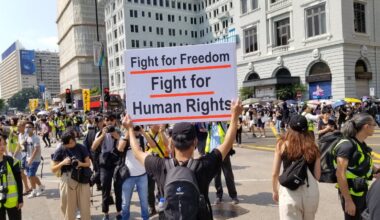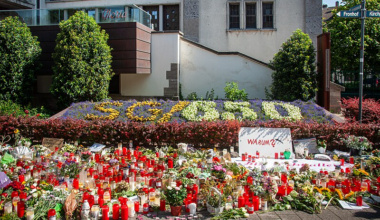
It is becoming more and more typical for politicians in Britain to whip up religious sentiments to win over Muslim votes as the country prepares for the general election on 4 July. Since Muslims’ religious sentiments are currently—and profoundly—entwined with what is happening in Gaza, a political party’s stance on this issue might determine how much support it receives in areas with a significant number of Muslim voters. Unsurprisingly, then, some politicians have started using their support for Gaza as a bargaining chip to win Muslim votes.
In a video that has gone viral online, Angela Rayner, the deputy leader of the Labour Party, makes an appeal to a Muslim audience (one apparently composed solely of men), promising that her party will recognise the state of Palestine if they support her.
Lamentably, such political theatrics seem to have emboldened some fringe elements within British Muslim communities who seek to use religious identity to stir up division in British society.
The Muslim Vote (TMV), which targets ‘seats where the Muslim vote can influence the outcome’ and aims to create ‘a powerful, united force of 4 million acting in unison’, seems to aim to weaponise religious identity in a bid to gain political clout. With its list of approved candidates—i.e. those who can be counted on to promote TMV’s agenda—and its obsession with religious identity, TMV seems to think it represents all British Muslims, and it seeks to capitalise on the ongoing conflict in Gaza to sway them.
It should therefore come as no surprise that highly contentious Muslim organisations such as Muslim Engagement and Development (Mend) and the Muslim Association of Britain (MAB)—both of which are under investigation for extremism—are backers of TMV. Indeed, Communities Secretary Michael Gove has even said in Parliament that MAB’s ‘Islamist orientation and views’ were a cause for concern.
A video posted (and since removed) by 5Pillars, a group that was described by Sara Khan in 2017 as ‘Islamist’, shows Asrar Rashid, a Muslim cleric, publicly endorsing two Muslim candidates contesting important Birmingham seats against the Labour Party. One of them, the British-Kashmiri activist Shakeel Afsar, had this to say during the controversy over the film The Lady of Heaven in 2022:
‘The city of Birmingham will not tolerate the disrespect of our prophet (pbuh), and there will be outcomes from your actions. You will have repercussions for your actions. We have been trained from birth that we must defend the honour of our prophet and we will lay our life on the line.’
Are such sectarian rabble-rousers really representative of all British Muslims? It seems not, because they are deliberately fostering antagonism against Muslim candidates who refuse to toe the line.
Meanwhile, some shameless politicians are openly embracing Muslim identitarianism in their bid to gain power. George Galloway, leader of the Workers Party of Britain, was recently caught on camera using the language of religious demagoguery to browbeat Muslims into not voting for Labour:
‘Do you think God is listening to someone who is praying one day and voting for Keir Starmer the day before? What kind of a believer would that be?’
Imagine those who, out of a simple desire to be decent religious people, might feel pressured—even threatened—to comply with his demands. This is blatant religious coercion. Radical provocateurs, Muslim and non-Muslim alike, are openly employing such coercion to win votes. The rise of this sort of rhetoric in a secular democracy is alarming.
How shameful that we in Britain seem to be going down the same path [as Iran], embracing theocratic rhetoric in our supposedly free and fair elections.
Pressure like this might even be illegal. Section 114A of the Representation of the People Act states that it is an offence to influence elections by ‘causing spiritual injury to, or placing undue spiritual pressure’ on voters. Yet, in the face of Galloway’s threatening religious rhetoric, the authorities are, staggeringly, silent.
In Islamic theocracies like Iran, such undemocratic discourse is very familiar. In Iran, religious clerics are the ultimate power, not the people—and the Iranian people, who have been protesting against the government since 2022, know this all too well. How shameful that we in Britain seem to be going down the same path, embracing theocratic rhetoric in our supposedly free and fair elections.
Some media pundits attempt to simplify the situation by claiming that the British Muslim vote is being driven away from the mainstream political parties over the issue of Gaza. But saying that there is no such thing as a ‘Muslim vote’ is naïve: the problem goes much deeper than just the flashpoint of Gaza. The Muslim vote is a fact of British politics now, thanks to years of campaigning on the part of Islamists to build a theocratic voting base by weaponising religious identity. This is sinister and will have dire consequences for our secular democracy.
It is true that many British Muslims are concerned about things such as employment, housing, educational opportunities, and a bright, prosperous future. However, it is wrong to underestimate the influence of religious coercion in Muslim communities. It has long been an open secret that religious zealots in Britain have bullied and harassed people into conforming to their ways.
During the 2021 by-election in Batley and Spen, a group of Muslim women wrote an anonymous open letter in which they condemned the ‘shameful’ behaviour of certain self-proclaimed Muslim community leaders who created chaos during the election campaign. The letter added that these are ‘the same faces that have plagued our area…for many years.’ That these women felt they had to write anonymously for fear of being targeted is a testament to just how deeply our politics has been infected by religious bullying.
This explains the conduct of the many British politicians who continue to focus their attention on the radical voices of self-appointed community spokesmen as if such people actually represented their community. Muslims who oppose these ‘spokesmen’ and their heinous acts of intimidation have been silenced, and those who aspire to integrate into British culture more broadly are either shunned or disregarded, or worse.
It is time for British politicians to move past polarising identity politics and focus on the country’s most pressing issues.
Now, groups like TMV feel confident enough to issue lists of demands to Keir Starmer, which, they say, he must act on if he is to win the support of Muslims. That these demands are simply part of a particular religio-political agenda is clear enough to see. The goal seems to be to disrupt conventional electoral politics and create parties that prioritise religious identity over secular democracy—not to provide a voice for British Muslims.
It is time for British politicians to move past polarising identity politics and focus on the country’s most pressing issues, which impact people from all walks of life, including those from Muslim communities: lawlessness, violence, extremism, and the cost of living, to name but a few.
British Muslims should also realise the perils of being silent in the face of toxic religious identity politics. The so-called community leaders have long monopolised religious and political discourse, painting themselves as representative of all British Muslims—all the while disregarding concerns over the rights of women and other vulnerable people in Muslim communities.
Instead of continuing to foster the culture of fear and division that is already being cultivated in our society, voters should support candidates based on their ideas and their qualifications to be public servants, and politicians should be ready to serve the people of Britain regardless of their religious affiliations, rather than being held hostage to religious demands.
The best course of action for all of us is to promote a shared, inclusive identity that can bring people from all backgrounds together, rather than continuing to cut ourselves off from our fellow citizens on the basis of religion. In fact, I would even go so far as to say that British democracy depends upon it.
Related reading
The Michaela School and religious exceptionalism, by Khadija Khan
What secularists want from the next UK Government, by Stephen Evans
Faith schools: where do the political parties stand? by Stephen Evans
Three years on, the lessons of Batley are yet to be learned, by Jack Rivington
Silence of the teachers, by Nath Jnan
Britain’s liberal imam: Interview with Taj Hargey, by Emma Park
The perils of dropping a book, by Noel Yaxley
Britain’s blasphemy heritage, by David Nash
British Islam and the crisis of ‘wokeism’ in universities: interview with Steven Greer, by Emma Park
Cancel culture and religious intolerance: ‘Falsely Accused of Islamophobia’, by Steven Greer, by Daniel James Sharp
Rap versus theocracy: Toomaj Salehi and the fight for a free Iran, by Noel Yaxley
The ‘Women’s Revolution’: from two activists in Iran, by Rastine Mortad and Sadaf Sepiddasht
The need to rekindle irreverence for Islam in Muslim thought, by Kunwar Khuldune Shahid
When does a religious ideology become a political one? The case of Islam, by Niko Alm







Your email address will not be published. Comments are subject to our Community Guidelines. Required fields are marked *
Donate